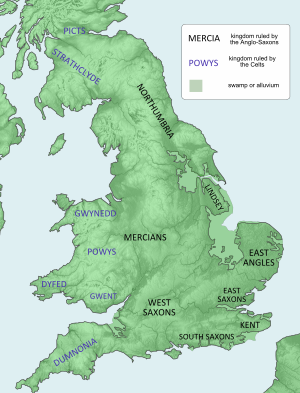Coenred of Mercia facts for kids
Coenred (also known as Cenred) was a king of Mercia, an important Anglo-Saxon kingdom in what is now central England. He ruled from 704 to 709. Coenred was the son of King Wulfhere. When Wulfhere died, Coenred's uncle, Æthelred, became king. In 704, Æthelred decided to stop being king and became a monk instead. This is when Coenred took over the throne.
Coenred's time as king isn't well-known, but we do know that his kingdom faced attacks from the Welsh. He didn't have a wife or children that we know of. In 709, Coenred also decided to give up his crown. He went on a special journey, called a pilgrimage, to Rome. There, he became a monk and stayed until he died. A famous writer named Bede said that Coenred "ruled the kingdom of Mercia for some time and very nobly." After Coenred, his cousin Ceolred became the next king of Mercia.
Mercia: An Old English Kingdom
By the 600s, England was divided into several kingdoms. Most of these were ruled by the Anglo-Saxons, who had arrived in Britain about 200 years earlier. The kingdom of Mercia was located in the middle of England. To the north was Northumbria, to the east was East Anglia, and to the south was Wessex. The kingdom of Essex, which included London, was between East Anglia and kingdom of Kent. The first Mercian king we know a lot about was Penda of Mercia, who was Coenred's grandfather.
Most of what we know about this time comes from a book written by Bede around 731. It's called Historia ecclesiastica gentis Anglorum, which means "Ecclesiastical History of the English People." Even though it focuses on the church, it gives us important details about the early Anglo-Saxon kingdoms. We also learn from old documents called Charters, which recorded kings giving land away. The Anglo-Saxon Chronicle, written later in the 800s, also mentions Coenred.
Coenred's Family and Rule
Coenred's father, Wulfhere, became king of Mercia in 658. This happened after Northumbria had controlled Mercia for three years. When Wulfhere died in 675, his brother Æthelred (Coenred's uncle) became king. Coenred might have been too young to rule at that time. Coenred's mother, Ermenilda, became a nun after Wulfhere died.
Æthelred won an important battle against the Northumbrians in 679. This battle, and another one where the Picts defeated Northumbria in 685, made Northumbria less powerful. Mercia also became more active in the southeast of England. Æthelred attacked Kent in 676. He also confirmed land gifts made by kings in Kent and to the bishop of London. However, Mercia didn't expand much further south because Wessex was growing stronger under kings like Cædwalla and Ine.
Old records say that Coenred became king of the "Southumbrians" in 702 and then king of Mercia in 704. The "Southumbrians" were people living south of the River Humber, which was Mercia's northern border. This might mean Coenred and Æthelred ruled together for a couple of years, or it could be the same event recorded twice. Even though Æthelred had his own son, Ceolred, he chose Coenred to be his heir. Æthelred still had some influence during Coenred's rule. He even made Coenred promise to support a religious leader named Wilfrid.
Coenred's time as king is not well-documented. However, a writer named Felix mentioned conflicts with the Britons (the native people of Britain, often called Welsh). Felix wrote that the Britons were "troubling the English with their attacks, their pillaging, and their devastations."
Some old documents from Coenred's reign show that he was the overlord of the rulers in Essex. Offa, an Essex king, made a land gift that Coenred later confirmed. In that document, Coenred called Offa his "underking," meaning Offa ruled under Coenred's authority. Coenred also confirmed gifts to the Bishop of London, showing that London was under Mercian control. Later Mercian kings would directly control London, but Coenred didn't go that far.
Mercia's power in Kent was limited during Coenred's reign. A letter from 704 or 705 shows that Coenred invited the Bishop of London to a meeting. This meeting was meant to settle a disagreement between the kings of Essex and Wessex. This shows that the southern English kingdoms were not united and didn't have one main ruler at that time.
Coenred Becomes a Monk
Coenred seemed to be a very religious king. The writer Bede tells a story about one of Coenred's friends whose sins led him to ruin, even though Coenred begged him to change. In 709, Coenred decided to give up his throne to his cousin Ceolred, Æthelred's son. Coenred then traveled to Rome to become a monk. Some people think Bede's story about the sinful friend might be why Coenred made this decision, but it's just a guess.
Coenred went to Rome with Offa, the king of Essex. In Rome, Pope Constantine made them both monks. An old record of the Popes, called the Liber Pontificalis, mentions their arrival: "two kings of the Saxons came with many others to pray to the apostles." Coenred stayed in Rome until he died, but we don't know the exact date.
Historians generally believe that Coenred and Offa gave up their thrones willingly, as Bede describes. However, some historians wonder if they might have been forced to become monks. Sometimes, kings were made to join monasteries so they couldn't rule anymore. But if Coenred went willingly, it shows that the relationship between a powerful overlord and a lesser king could be friendly.
Coenred was given a special haircut called a tonsure when he became a monk in Rome. He stayed there until he died. We don't have any records of him having a wife or children. However, a later book from Evesham Abbey claims that Coenred was an ancestor of a later Mercian figure named Wigstan.
|
 | Delilah Pierce |
 | Gordon Parks |
 | Augusta Savage |
 | Charles Ethan Porter |



